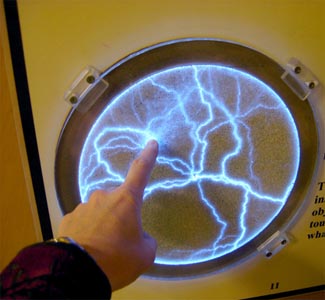Scientists create plastic that conducts electricity
 Plastics are well known as poor conductors of electricity and find many applications in industries and households as insulators. But now scientists have claimed that they have prepared a new class of plastic material that conducts electricity similar to metals.
Plastics are well known as poor conductors of electricity and find many applications in industries and households as insulators. But now scientists have claimed that they have prepared a new class of plastic material that conducts electricity similar to metals.
Scientists placed a thin film of metal on a plastic sheet. They mixed it with polymer surface using an ion beam. In this experiment, researchers found that the material well conducted electricity. Research was done by an international team of scientists.
Scientists found that this method can be used to produce cheaper, stronger, flexible and above all, conducting plastic films. Prof Paul Meredith of University of Queensland said about the research, "What the team has been able to do here is use an ion beam to tune the properties of a plastic film so that it conducts electricity like the metals used in the electrical wires themselves, and even to act as a superconductor and pass electric current without resistance if cooled to low enough temperature."
When this newly created material is tested in industry standards and all claims of research team proved valid. In order to verify conductivity, team created electrical resistance thermometers of industrial standard. Then team created another platinum resistance thermometer of industrial standard. When tested thoroughly, this material gave even better results, with comparable accuracy.
A team member, Prof Adam Micolich of University of New South Wales explained the excellency of this material. Micolich said this material has an advantage that it can adopt all desirable properties of polymers like flexibility, robustness and easy availability with additional feature of conducting electricity. Conventional metals which are used as electricity conductors usually do not possess all above described properties, making this new material more valuable. Adams said this discovery will begin a new era of plastic electronics.
Researchers said their material opens a wide scope in electrical conductivity. Scientists are capable of manipulating conductivity levels in the thin film from zero to that of metals, making it highly usable while designing electricity based products.